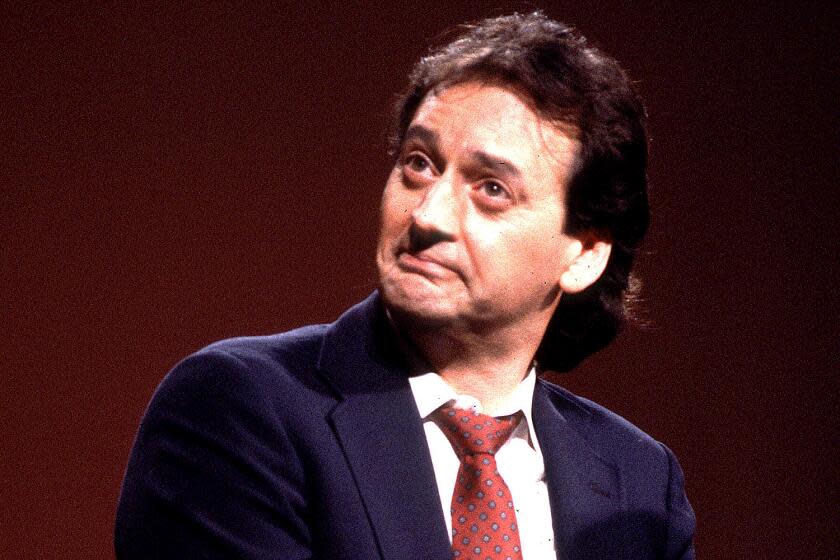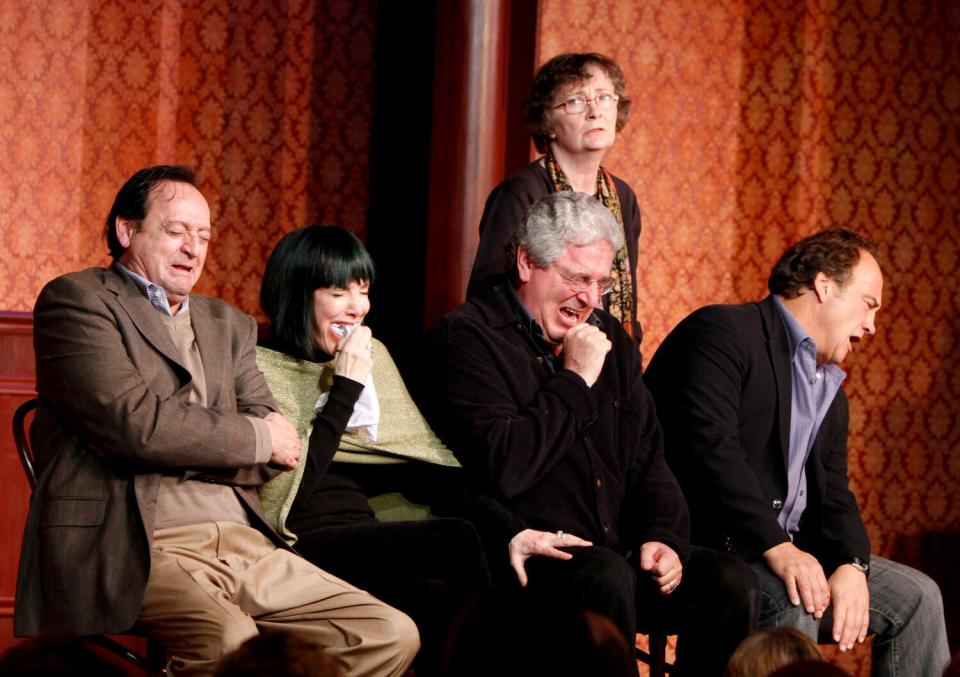Joe Flaherty will always remain dear to comedy fans, thanks to 'SCTV' and 'Freaks and Geeks'

For the record:
11:03 a.m. April 3, 2024: An earlier version of this article called “Freaks and Geeks” a CBS comedy. It aired on NBC.
Though he worked steadily into the second decade of this century, Joe Flaherty, who died Monday at 82, will be remembered for two series: the Canadian sketch comedy "SCTV," which sneaked onto American television by way of late-night syndication in the late 1970s, and "Freaks and Geeks," the 1999 NBC comedy that would prove to be ground zero for American comedy in the 2000s.
Neither were hugely successful in their time — "SCTV," though it twice won Emmys for writing, shared by Flaherty, was overshadowed by "Saturday Night Live," the other series to emerge from Second City, and "Freaks and Geeks" lasted only a single, 18-episode season. But both are dear to the heart of comedy fans, and the characters Flaherty created there live large in my mind, and I hope in yours.
Read more: Joe Flaherty, ‘Freaks and Geeks’ and ‘SCTV’ star, dies at 82
"SCTV," which purported to represent the programming day of a small-town station — Melonville was the imaginary community — was a vehicle for television, commercial and movie parodies, but it also pulled back to focus on the business of the station itself, owned by Flaherty's Guy Caballero. Wearing a white suit and a panama hat, seated in a wheelchair of which he had no actual need, he was Lionel Barrymore Jr. as a cheap, shady media mogul. It was my preferred late-night sketch comedy, for its world-building, oddness and otherness and, not incidentally, because it felt like something of a secret, a treasure one stumbled upon, rather than the heavily promoted, Rolling Stone-approved, major-network "SNL," with its A-list guest hosts and musicians.
Tall and good looking, Flaherty — American, born in Pittsburgh — was as close to a conventional leading man as "SCTV" had on tap; Kirk Douglas, Alan Alda and Gregory Peck were among the actors he impersonated. (For what it's worth, he was older, and so marginally more mature, than his castmates.) Among his notable original characters were Caballero; Sammy Maudlin, the overly effusive, overemotional host of a variety talk show; and most memorably, Count Floyd, the howling, cackling, frustrated vampiric host of "Monster Chiller Horror Theatre." (In the world-within-a-world way of the series, Count Floyd was played by another Flaherty character, Floyd Robertson, the upright co-host of "SCTV News" with Eugene Levy's clownish, annoying Earl Camembert.)

Floyd, whom one associates with the phrase "Oooh, scary, kids!," though I can't actually find an example of him saying those words in that order, had a life beyond "SCTV" as well: "Count Floyd's Scary Stories" was a live-action segment of "SCTV" castmate Martin Short's 1988 animated series, "The Completely Mental Misadventures of Ed Grimley," while Canada's Rush featured him on video introducing "The Weapon" on their 1984 Grace Under Pressure Tour: "It's a scary song, one of the scariest I've ever heard!" Flaherty also released an EP as Count Floyd, in 1982, including the disco number "Treat You Like a Lady" and "Reggae Christmas Eve in Transylvania."
On "Freaks and Geeks," Flaherty played Harold Weir, the middle-aged, middle-class father of central characters Lindsay (Linda Cardellini) and Sam (John Francis Daley), husband to Becky Ann Baker's Jean, and a stand-in for creator Paul Feig's own father. A hardworking man who desired as little disruption in his home as possible — Harold owned a sporting goods store, whereas Feig's father was in hardware — his children's behavior often challenged his patience and understanding; but there were also scenes of great tenderness, all the more powerful for being unexpected. (As when he gives serious advice to Jason Segel's floundering Nick, a temporary house guest.) Where sitcom fathers have tended to be either impossibly perfect or buffoons, Flaherty imbued Harold Weir with comic dignity, no less dignified for being comic, nor comic for being dignified — an imperfect perfect father. It's a beautiful performance.
"Everybody in this business, when they’re getting a show together, they all say, 'Oh, I want it to be character driven,' and nobody is able to do that really well,to be honest," Flaherty said when I interviewed him in 2012 for a "Freaks and Geeks" oral history. "But this show really was. It was all about characters, and behavior, and relationships."
Flaherty will be remembered too, for a small but key part in a big movie franchise. At the climax of the 1989 "Back to the Future II," a shadowy figure emerges from a car in the rain to deliver a letter to Michael J. Fox's Marty McFly; the impact of that scene for some of us was not, "Doc Brown is in the Old West," or "There's another one of these movies coming," but "Hey, it's Joe Flaherty!" (The record shows that he made an impression as a heckler in Adam Sandler's 1996 "Happy Gilmore," but that is a film I have yet to see.) If he never achieved the big-screen stardom that came to "SCTV" castmates like Short, John Candy, Andrea Martin and Rick Moranis, or the late-career renaissance that "Schitt's Creek" brought Levy and Catherine O'Hara — Flaherty was in his late 50s when "Freaks and Geeks" came calling 25 years ago — that may have simply been the fate of a versatile regular guy who could disappear into a part.
Nevertheless, he leaves a substantial legacy.
"I'll go to YouTube and look at the scenes and I'll go, 'That's good, we did well there,'" Flaherty told me about "Freaks and Geeks." "And I had that feeling with 'SCTV' when we all gathered around as a cast and we watched the show, I remember thinking, 'Damn, that was good, I would watch that show.' Same thing when we watched 'Freaks and Geeks' as a cast, gathered round, I thought 'Damn, that was good!'"
This story originally appeared in Los Angeles Times.
